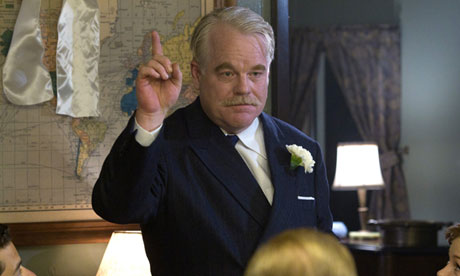
Paul Thomas Anderson's new movie The Master is brilliant, mysterious and unbearably sad, in approximately that narrative order. It is just that brilliance and formal distinction, together with a touch of hubris in the title, that could divide commentators. Anderson has within living memory knocked us for the biggest loop with his There Will Be Blood in 2007, and nothing makes critics more nervous than a director who makes two exceptional films in a row. Reviewers get a bit self-conscious about dishing out the top prize again, scared of looking like fanboys and pushovers. They feel the need to change the mood, to validate the uniqueness of their former praise. And I admit that after seeing The Master for the first time at the Venice film festival (the second was in London this week), I experienced a dark and timid microsecond of the soul on this score, before I swallowed my pride and just responded to what was in front of me: a superb film.
Like a lot of Anderson's previous work, it is about pioneers, leaders and dysfunctional families, and like There Will Be Blood it is about the origins of American modernity, the pre-history of a certain kind of self-help and self-belief, entrepreneurial and evangelical. In this case, it is the Year Zero of a belief system that does not yet have extreme age to put its irrationality above reproach. The Master is about homemade spirituality and gimcrack philosophy, a snake-oil salesman of religion offering self-medication of the mind and body, attracting desperately lonely and vulnerable people to his new cult. It all happens in a meticulously realised postwar America, like something from the pages of Steinbeck or DeLillo, but with bizarre setpieces and an extra-terrestrial strangeness all of its own. Jonny Greenwood's unsettling score makes a strong contribution.
Joaquin Phoenix gives a laceratingly powerful performance as Freddie Quell, invalided out of the US Navy in 1945 with a nervous breakdown, exacerbated by addiction to his own moonshine. His face is incised and gaunt like that of a medieval saint, he mumbles and giggles almost unintelligibly; walking around with his fists in the small of his back, elbows akimbo, like someone recovering from a terrible injury – which of course is what he is. (To me, Phoenix's Quell looks a little like Neal Cassady, the model for Dean Moriarty in Kerouac's On the Road.) Living semi-rough and on the lam, Freddie finds himself stowing away on a grand and somewhat preposterous steamboat.
In charge is the charismatic Lancaster Dodd, played by Philip Seymour Hoffman, a puce-faced public speaker who styles himself "The Master", hammy and plummy and steely. Dodd is a mix of L Ron Hubbard, Ayn Rand and Dale Carnegie. He believes in curing physical and psychological ills by rooting out previous selves and interplanetary interlopers from millions of years ago, through confrontational interrogations and therapies that are like hypnosis or recovered memory or even electro-convulsive shock treatment. The Master is amused by Quell, gets a taste for his hooch, and decides to make of him a special case for his treatment. Freddie is the Fool to his Lear, or Peter (or maybe Judas) to his Jesus. The Master resolves to break Freddie down and build him up anew, and Quell's chaos and Dodd's charlatanism become locked together in a dance of death – erotic and homoerotic.
When I first saw The Master, I saw it as an eloquent drama of ideas, a Foucauldian account of unreason, all about crazy and marginal worldviews excluded from mainstream histories of the western enlightenment. On a second viewing, I responded far more to the personal story of Quell and Dodd, and their absurd, sinister and poignantly doomed love story. Freddie's gift for brewing up moonshine out of anything to hand (paint-stripper, developing fluid, fruit, bread) and making himself the life and soul of the party is no incidental detail. His booze-genius is of course analogous to Dodd's gift for intoxicating rhetoric and ideas, cobbled together from bits and pieces of science and established religion. They are a match made in sociopath heaven. Both have a long-term addiction to their own supply, and maybe Quell and Dodd are the ancestors of showbiz faith; they fully understand the masses' opiate, having tested it extensively on themselves. But more than this, Anderson suggests that Quell is ultimately wiser than Dodd, and has finally understood that his association with him is happening on the rebound, the effect of personal heartbreak, missed chances and a lifetime of regret. The Master is a supremely confident work from a unique film-maker, just so different from the standard Hollywood output: audacious and unmissable.

